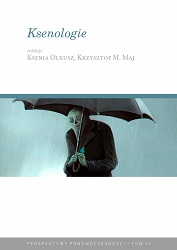W obcym świecie czyli o obrazie dziecka-uchodźcy w najnowszej prozie niemieckojęzycznej
In the Otherworld, or On the Image of Children Refugees in Contemporary German Fiction
"Das Mädchen mit dem Fingerhut" (2016) by Michael Köhlmeier
Author(s): Aneta Jurzysta
Subject(s): Language and Literature Studies, Studies of Literature, German Literature
Published by: Ośrodek Badawczy Facta Ficta
Summary/Abstract: The global community is currently in the midst of a refugee crisis unlike anything seen since WWII. Only the Syrian Civil War has displaced millions, forcing nearly five million civilians to flee the war-torn country and leaving millions more adrift within its borders. The plight of refugees is back at the top of news bulletins but it has been a constant theme in modern literature. The current trauma of displaced people on the move in Europe is nothing new, and accounts of forced migration have been told since the earliest times. The refugee experience is a well-documented one: there are quite a number of great works of literature either written by refugees, or dealing with the refugee experience. Aneta Jurzysta in her analysis focuses on the latest novel by Michael Köhlmeier that looks at the refugee crisis from a child’s perspective. Köhlmeier’s dark fairy tale, first published in Germany in 2016 as “Das Mädchen mit dem Fingerhut” (“The Girl With the Thimble”), takes its English title from its protagonist, Yiza, a six-year-old girl who escapes with two older boys from a home for migrant children. Trekking through snowy forests and housing settlements, they evade police custody, subsisting on the margins of society. Narrated in simple language that reflects the slow-burn, linear thought processes of children, Das Mädchen mit dem Fingerhut is a pertinent and timely tale of displacement, foreignness and suffering. In an unnamed country, a trio of homeless children of unspecified nationalities like feral animals on the loose are trying by their will and their wits to survive another day. Köhlmeier’s novella, written in clipped prose, captures the narrow, frightened world-view of the war-scarred children in a cultural, climatic, and linguistic wasteland.
Book: Ksenologie
- Page Range: 273-293
- Page Count: 21
- Publication Year: 2018
- Language: Polish
- Content File-PDF

